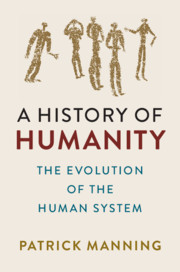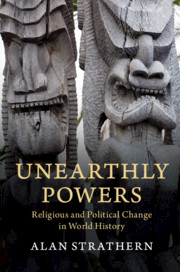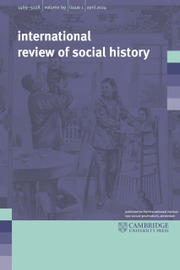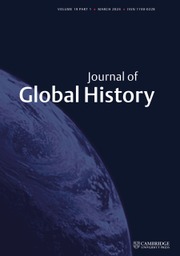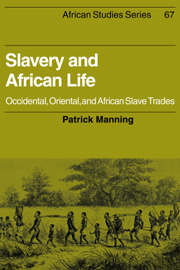A History of Humanity
The Evolution of the Human System
$25.99 USD
- Author: Patrick Manning, University of Pittsburgh
- Date Published: February 2020
- availability: This ISBN is for an eBook version which is distributed on our behalf by a third party.
- format: Adobe eBook Reader
- isbn: 9781108788595
Find out more about Cambridge eBooks
$
25.99 USD
Adobe eBook Reader
Other available formats:
Paperback, Hardback
Looking for an inspection copy?
This title is not currently available on inspection
-
Humanity today functions as a gigantic, world-encompassing system. Renowned world historian, Patrick Manning traces how this human system evolved from Homo Sapiens' beginnings over 200,000 years ago right up to the present day. He focuses on three great shifts in the scale of social organization - the rise of syntactical language, of agricultural society, and today's newly global social discourse - and links processes of social evolution to the dynamics of biological and cultural evolution. Throughout each of these shifts, migration and social diversity have been central, and social institutions have existed in a delicate balance, serving not just their own members but undergoing regulation from society. Integrating approaches from world history, environmental studies, biological and cultural evolution, social anthropology, sociology, and evolutionary linguistics, Patrick Manning offers an unprecedented account of the evolution of humans and our complex social system and explores the crises facing that human system today.
Read more- Demonstrates how human capabilities and social institutions arose through various processes of biological and cultural evolution, migration, and social evolution - resulting in the unique character of human society
- Explores how the development of the human system now threatens the natural world of Gaia and threatens social conflict within and among societies
- Integrates a wide range of disciplines and approaches in natural and social sciences, including history, evolutionary biology, cultural evolution, linguistics, systems theory, paleontology, environmental studies, psychology, history of science, popular culture, and philosophy
Reviews & endorsements
'A great world historian surveys the whole of human history, offering new insights and perspectives into 'the human system'. This is world history on a canvas broad enough to help us think seriously about how we got to dominate planet earth … and where it is all going.' David Christian, author of Origin Story: A Big History of Everything
See more reviews'Our age sorely needs clear accounts of the human past. Manning provides a thoughtful one in ten brief chapters with a provocative premise - what he calls the human system - blending biological and cultural evolution into a coherent historical vision. All interested in world history will want to read it.' J. R. McNeill, author of Something New Under the Sun
'People talk and they walk, and that has made all the difference. This brief book by a master historian integrates research from many disciplines to trace the evolution of human society from the Pleistocene to today, highlighting the role of spoken language and migration in creating the human system that now dominates the planet.' Merry E. Wiesner-Hanks, Editor-in-chief of Cambridge World History
'Patrick Manning has written a stimulating and exciting history of humanity, from the dawn of Homo to today, with a look to the future. This book introduces many new ideas about language, society, and institutions, challenging old paradigms and rethinking human progress.' E.N. Anderson, author of The East Asian World-System: Climate and Dynastic Change
'In his unconventional and wide-ranging book Patrick Manning knits together an intricate account of how human beings became the unusual biological, cultural, and social entity they are. Whatever your stance on the many issues it broaches, it will get you thinking.' Ian Tattersall, co-author of The Accidental Homo sapiens: Genetics, Behavior, and Free Will
'This study is history on a grand scale …' Brian Fagan, Journal of Interdisciplinary History
Customer reviews
Not yet reviewed
Be the first to review
Review was not posted due to profanity
×Product details
- Date Published: February 2020
- format: Adobe eBook Reader
- isbn: 9781108788595
- contains: 13 maps
- availability: This ISBN is for an eBook version which is distributed on our behalf by a third party.
Table of Contents
List of maps
List of figures
List of tables
Preface
Acknowledgments
Part I. Introduction:
1. The human system
Part II. Pleistocene Evolution:
2. Biological and cultural evolution
3. Speech and social evolution
4. Systemic expansion
5. Production and confederation
Part III. Holocene Evolution:
6. Society: network vs hierarchy
7. Collisions and contraction
8. From global networks to capitalism
Part IV. Anthropocene Evolution:
9. Systemic threats
10. Hope for adaptations
Appendix. Frameworks for analysis
Notes
Glossary
Bibliography
Index.-
General Resources
Find resources associated with this title
Type Name Unlocked * Format Size Showing of
This title is supported by one or more locked resources. Access to locked resources is granted exclusively by Cambridge University Press to lecturers whose faculty status has been verified. To gain access to locked resources, lecturers should sign in to or register for a Cambridge user account.
Please use locked resources responsibly and exercise your professional discretion when choosing how you share these materials with your students. Other lecturers may wish to use locked resources for assessment purposes and their usefulness is undermined when the source files (for example, solution manuals or test banks) are shared online or via social networks.
Supplementary resources are subject to copyright. Lecturers are permitted to view, print or download these resources for use in their teaching, but may not change them or use them for commercial gain.
If you are having problems accessing these resources please contact lecturers@cambridge.org.
Sorry, this resource is locked
Please register or sign in to request access. If you are having problems accessing these resources please email lecturers@cambridge.org
Register Sign in» Proceed
You are now leaving the Cambridge University Press website. Your eBook purchase and download will be completed by our partner www.ebooks.com. Please see the permission section of the www.ebooks.com catalogue page for details of the print & copy limits on our eBooks.
Continue ×Are you sure you want to delete your account?
This cannot be undone.
Thank you for your feedback which will help us improve our service.
If you requested a response, we will make sure to get back to you shortly.
×
